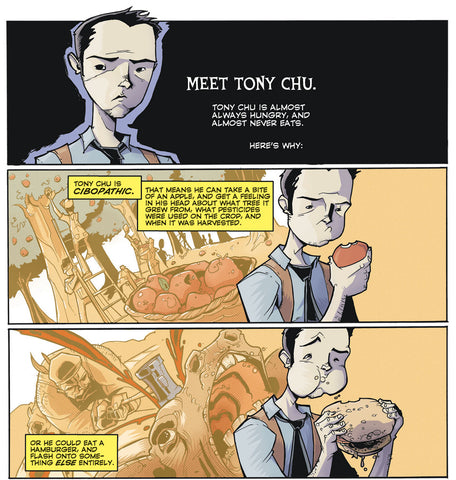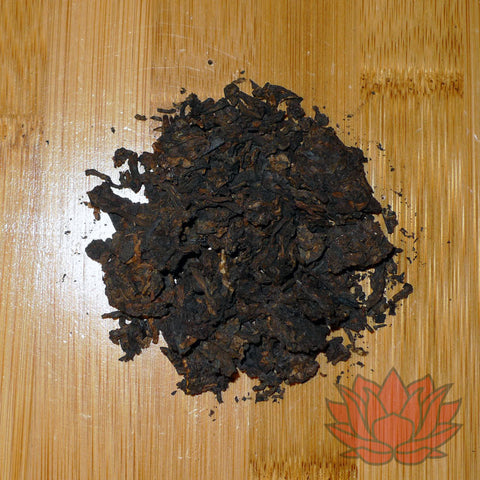Tea Tasting
2008 Menghai V93 Take 2 January 17 2014
I've been going over the tasting notes I put down for the 2008 Menghai V93 Shou Puerh Tuo Cha, and I don't feel that this venerable little tuo cha got a proper review. The week I was tasting the V93 I began to notice more of my puerh having a stronger metallic taste with higher than normal mineral notes. Some of these puerhs I have been drinking for quite some time and know how they feel and taste. After some research I came to the conclusion that some medicine I was on had introduced temporary dysgeusia to my palate. That's a big word that simply means "distortion of the sense of taste". That's not the best way to prepare for a tea tasting!
I was pretty worried that the changes were permanent. I did a lot of reading that week on taste buds and how the human body perceives tastes and smells. It's quite an interesting science. Thankfully the medicine was temporary and soon my taste buds were returning to normal. I don't have the world's greatest taste buds by any stretch of the imagination, but I would miss them if they were gone. I greatly admire those individuals who have such heightened senses that they can sip a glass of wine and immediately recognize what breed of dog the winegrower had let play in the vineyard.
One of my favorite comic books recently has been "Chew"; the story of FDA inspector Tony Chu. He is unique among his peers for his uncanny ability as a 'Cibopath'. In the world created by this comic book a cibopath is a person who gains psychic insight from things they taste. In his case it's a HUGE problem since if he eats a hamburger he can actually see the cow being slaughtered. As an agent for the FDA though he can immediately know where food was smuggled from illegally just by putting it in his mouth. Fantastical for sure, but it makes for an entertaining story! I can only hope that my taste buds some day mature to the point that I can determine deeper puerh particulars from my tastings.

http://www.comicbookresources.com/?page=article&id=20923
All that to say that my previous review of the 2008 Menghai V93 was being incorrectly skewed by the introduction of a dysgeusia inducing foreign agent. Since my taste buds are back on track I have had a few more tastings with the V93 to get a better sense of this puerh. What I have found is that my initial review was fairly close if I removed mentions of metallic and mineral notes. Additionally I've begun to notice some aroma hints of dried fruit like raisins or prunes.
This tea does brew dark with a quickness which I like in a shou puerh. It gives fast and lets you sit back to enjoy it. There is a full and smooth mouthfeel that is both thick and comforting. It's easy to drink this tea. I can still taste a slight bitterness, but that is intentional. Menghai set out to introduce a shou puerh that felt like a raw puerh. They cut short the additional fermentation that shou/ripe puerh goes through to keep the final product biologically similar to sheng/raw puerh. That is readily apparent in the brew. It probably also indicates that this puerh has some room for aging. The bitter/astringent notes will mellow with time.
The final results is that this is a very drinkable tea that is a great bargain at the price. It is definitely smooth and balanced and easy to drink. Pick one up and let me know what you think.
2008 Menghai V93 Shou Puerh Tasting Notes January 01 2014
(I have written an update to these tasting notes: http://crimsonlotustea.com/blogs/tea-tasting/11659429-2008-menghai-v93-take-2)
Background:
When we first got the V93 in stock it had a distinct fishy aroma. The smell was present only in the dry leaves. After brewing the smell was gone completely. I broke up the reamining tuo cha with a puerh knife and have been letting it get some air over the past couple months. The fishy aroma is gone completely. This tasting was done after the tuo cha had aired out and aged for a couple months.
When I do puerh tastings I use a gaiwan that holds a little more than 100ml of water. For Shou ( ripe / black ) puerh I always brew at boiling water. I wash once and then do 5 tastings with differing steep times. For this puerh I use 6s, 10s, 15s, 20s, and 30s steeps. The V93 I'm tasting today is an 801. That means that it was the first (01) batch of 200(8).

This gaiwan is porcelain lined and gives a very honest taste.
The leaves used are quite small and the stems are fairly short. Menghai did this intentionally. They chose to create a tuocha that was unique and outstanding in the field. Puerh sold in the tuo cha form factor in general is not representative of the best puerh available. Menghai set out to change that and began experimenting with some possibilities. Their creativity and experimentation was organized under the label "V". What they hoped to do was create a product that could be sold in the tuo cha form factor that would have balanced flavor. When they brought the V93 to market in 2005 it consisted of a weighted balance with smaller than average leaves. It was very well received and won awards at tea tasting competitions.

Tasting:
Inspecting the dry leaves shows very small compact leaves. The dry smell is simple and non obtrusive. The fishy aroma has disappeared. After I warm the gaiwan with boiling water and pour it off I add the leaves in quickly. I cover the gaiwan and give it a few shakes. I let the dry leaves warm inside the humidity of the enclosed gaiwan. After a minute I open the gaiwan to appreciate the warm smell. With these leaves the warm smell is sweet and clean. It's a very nice smell devoid of an pungent fishiness or mustiness.
I do a quick wash with boiling water and pour it off after just 3 seconds. I then appreciate the aroma of the now wet leaves while they're still absorbing water and opening up to give their full flavor in subsequent brews. The wet smell is also quite clean with just a hint of mineral vegetation.
The first steep is done for just 6s and the brew is already very dark. I use sniffer cups and let the brew cool for about 30s. The brew has a hint of banana in the aroma. There are some other smells I can't quite place. It is a very sweet smell; very pleasant. The taste has strong mineral notes that are almost metallic. There is very little aftertaste.
The second steep is at 10 seconds and the brew is darker than before. This time there are more vegetal aromas. It's still sweet. This brew had stronger mineral notes in the taste. There was a bit more aftertaste that included a very delicate bitterness.
The third steep is for 15 seconds and the brew continues into darkness. This time there is a very slight astringency. It's noticeable as a little dance at the back of the throat and sides of the tongue. It is a very clean taste that goes down easily.
The fourth steep is for 20 seconds. The aroma is the same and the astringency continues with a slight puckering of the taste buds at the rear sides of the tongue.
The fifth steep is for 30 seconds and is just as dark. These leaves are very generous. The sweet aroma has a hint of honeysuckle. This brew has the cleanest taste of all. No astringency now, but no real aftertaste either.
Inspecting the wet leaves shows that some clumps have stayed compressed together. You'll want to check that out after the wash. You can use your tongs to gently pry them open. The wet leaves have an enchanting nutty aroma.
Results:
Overall this puerh is unique for a tuo cha. The flavor is very balanced with no surprises. It takes the middle of the road and has no real highs or lows. It's very simple and smooth. I feel that it is one dimensional, but reliable. Lamu says it pairs nicely with Swedish meatballs. I have no opinion on that matter because she ate them all before I had a chance.
We have these available here: http://crimsonlotustea.com/products/2008-menghai-v93-shou-cooked-ripe-puerh-tuo-cha-100g
